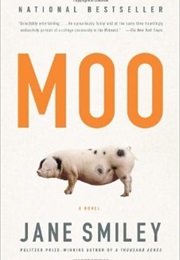
But she is still besotted with horses and while her six foot two frame ensured she would never be a jockey, her literary success has enabled her to buy a dozen racehorses, including 10 thoroughbreds, some of which are stabled at a lavish equestrian centre near her home in the Carmel Valley, California. The rather severe-looking short-haired brunette who stared out from Smiley's early book jackets is now a breezily friendly and informal presence with shoulder-length blonde hair.

In her sensuous responsiveness to the facts of the world, her cool, amused, analytical gaze, she has started to look like the best living American novelist". She is the most perfect vindication of the realist novel, of the speaking voice. Novelist Philip Hensher described her recent novels as "what Tom Wolfe's are popularly supposed to be. Reviewing it, British writer Julie Myerson claimed that Smiley "is without doubt one of the American literary giants, a rare, poised, feminine voice up there with all those loud, male ones like Roth and Updike". Her novel Horse Heaven (2000) was set on the international horse racing circuit and featured a vast cast of human, equine and even canine characters. Her clinical exposition of marital vicissitude, The Age of Grief (1987), earned her a large readership and her relocation of the King Lear story to the Iowa farmlands, A Thousand Acres (1991), won her a Pulitzer prize. Three and a half decades later, Smiley is the author of 11 novels and one of the most successful writers in the country. While she was never the most orthodox ultra-leftist - for one thing few of her comrades were as fanatical about horse-riding as she was - she nevertheless did her share of analysing the way America did business and agitating against it.



I n the late 1960s, Jane Smiley spent a summer living in a Maoist commune in Connecticut.


 0 kommentar(er)
0 kommentar(er)
